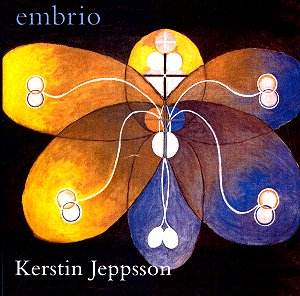The works featured
in this composer’s portrait span some
twenty-five years of Kerstin Jeppsson’s
composing career and thus provide a
fairly comprehensive survey of her present
output. Four of these pieces are vocal,
which says much for the composer’s concern
for the voice (she was trained as a
singer), even at some early stages of
her creative life. The earliest work
here Kvinnosånger
("Women’s Songs") were composed
in 1973 when she was still a student
of Maurice Karkoff. These songs for
soprano and piano are still clearly
indebted to the Nordic song tradition,
and somewhat redolent of early Lidholm
or of Karkoff himself. Fairly traditional,
straightforward but quite appealing.
These early songs are by no means prentice
works and already display some considerable
assurance.
The song-cycle for
mezzo-soprano and ensemble Impossibile
composed in 1977 show a clear stylistic
progress when compared to the earlier
songs. That said, these settings, again
eminently grateful to the ear, display
a more advanced idiom, though in no
way intractably modern or experimental.
Jeppsson is first and foremost a lyrical
composer for whom expression and communication
are paramount. This clearly shows in
this and the other pieces recorded here.
Impossibile is a work
"about shadows, darkness, and light".
The expert scoring for a dark human
voice (mezzo-soprano or alto) and small
ensemble allows for a wide range of
expression while being perfectly suited
to the often sombre moods suggested
by the words.
The three motets De
mörka änglarna ("The
Dark Angels") were not originally
conceived as a group. In fact, the first
piece Till dig was composed in
1980 whereas the other two were written
in 1988. On the whole, these beautifully
crafted and fairly simple settings are
traditional. They again aim at direct
communication in readily accessible
terms, which the composer achieves without
fuss but with remarkable efficiency.
The orchestral cycle
Embrio completed in 1990
is by far the most substantial and ambitious
piece in this release, and – no doubt
– a high watermark in Jeppsson’s present
output. "Embrio has
to do with germination, growth, and
change from something small – perhaps
a seed or a human embryo." This
impressive, almost Mahlerian song-cycle
sets three poems by Ulla Olin, which
she interprets in more universal terms
than those superficially suggested by
the words. The idea of growth is prominent
in this large-scale, almost symphonic
structure (actually this is the very
basis of any musical work). The substantial
first song opens with a weighty orchestral
introduction out of which the rest of
the piece grows. The second song is
more meditative and questioning in mood
whereas the final song partly looks
back on the opening movement before
reaching its assertive conclusion. Embrio
is a beautiful work and unquestionably
one of Jeppsson’s most impressive achievements
so far.
The Second String Quartet
was completed in 2000. The music, though
idiomatically written for strings, cannot
conceal the composer’s liking of vocal
textures, particularly so in the recitative-like
passages for the cello in the first
section and in the viola’s "introverted
sermon" in the second one. This
fine work ends with a dance-like final
section incorporating reminiscences
from the previous movements.
Much fine, worthwhile
and often beautiful music here that
generously repays repeated hearings.
All the performances are very fine and
well recorded, and serve the music well.
I now look forward to hearing more of
Jeppsson’s music soon. Recommended.
Hubert Culot
